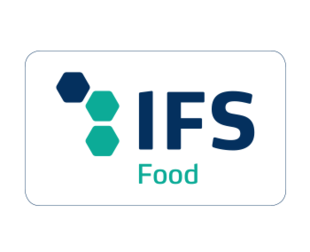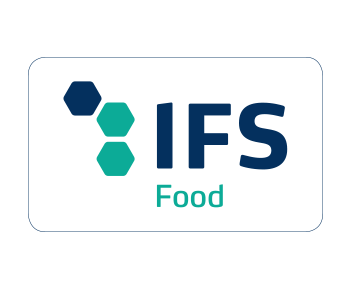Current standards in food production are becoming simpler
The demands on food and its producers are - rightly - high. Not only the demands on quality, but also on a safe production process cannot be overestimated. Groups must comply with legal requirements and are responsible for the continuous improvement of their products. As one of the most important standards in the food industry, the International Featured Standard Food (IFS Food) defines the requirements for food manufacturers. The IFS Food thus forms the basis for certifications in the area of food safety.
Published for the first time in 2003, the IFS Food is constantly being amended to redefine the standards for the food market and, above all, to simplify their application. This was the case most recently in April 2023, when IFS Food published version 8, replacing IFS Food version 7. The reason for this is the increased requirements of the Codex Alimentarius and ISO 22003-2 for product and process standards, in order to remain closer to the audit specifications. The revision of the assessment system, especially the B-assessment, as well as more uniform and concrete formulations, were also implemented.




Why not contact us?
Would you like an offer?
What are the deadlines for IFS Food Version 8?
For food manufacturers and manufacturing companies in the food sector, audits in standard version 8 will be possible from 1 October 2023 and mandatory from 1 January 2024.
The most important innovations of IFS Food 8 at a glance
For the revision of IFS Food 7, which was only introduced in July 2021, the experiences of various stakeholders were taken into account in the improvements. The practical experiences were used to be more consistent and precise in the wording with IFS Food version 8, to revise the assessment system and to reassign some criteria - this now corresponds better to the practical audit process. The IFS Doctrine, an accompanying document with explanations and interpretation aids for the requirements of the standard, was also revised. This is intended to improve clarity, readability and practicability by containing significantly fewer cross-references. You will find concrete changes mainly in these areas:
Chapter 1: Additions to the topics of politics and sustainability
- IFS Food 8 provides for changes in the area of policy and sustainability, particularly in relation to communication about food safety policies and responsibilities.
- This includes for companies to train their employees, seek feedback and measure performance.
If there are any anomalies in food safety, legality or food fraud, companies must report them to their certification body. - A management review must take place within twelve months. A maximum of 15 months is now specified as the new time period.
Chapter 2: Innovations in relation to the HACCP plan
Businesses must have their HACCP plan validated and a review procedure established. The validation procedures, including revalidation after any change that may affect food safety, shall be documented, implemented and maintained to ensure that the HACCP plan is adequate to effectively control the identified hazards.
Chapter 3: Changes in personal hygiene
Within three months, food manufacturers have to check the requirements and their compliance with personnel hygiene. The focus is primarily on the effectiveness of training and education.
Chapter 4: Extensions to the test and monitoring plan
In IFS Food version 8, KO point 4 (raw material specifications) has been expanded to include the inspection and monitoring plan and purchasing has been expanded to include food fraud. Companies are now required to develop, implement and maintain a procedure for the procurement of materials and the approval and monitoring of (internal and external) suppliers.
Risks related to raw materials and/or suppliers
Risks related to raw materials and/or suppliers include, for example, compliance with required performance standards (certification, origin, etc.) , exceptional situations (such as emergency purchases) and - depending on the risk - additional issues such as:
- audits carried out by an experienced as well as competent person
- Audit results
- Delivery reliability
- Complaints
- Supplier questionnaire
The criteria for cleaning and disinfection in food processing companies have been extended to include CIP criteria. For better traceability, the item "work in progress" was introduced as well as "the traceability of finished products to raw materials and customers must now take place within a maximum of four hours". Allergen management was expanded to include staff and visitors, and the topic of food defence is now included under item 4.21 ff. In particular, the handling of external inspections and official visitors is taken into account in requirement 4.21.2.
Chapter 5: Changes in the area of test equipment
There are further additions in IFS Food Version 8 in the area of test equipment: It is now prescribed that in the event of a malfunction, the effects on processes and products must be assessed to ensure that no non-compliant products have been processed. In addition, a new requirement has been added under item 5.6 "Testing and environmental monitoring": The criteria for the environmental monitoring programme must be documented, implemented and maintained based on the risks.
There is also a concretisation with regard to recalls, product withdrawals and incidents: responsibilities are now clearly assigned and responsible persons are trained accordingly. In addition, it is now mandatory that the communication plan also includes customers and end consumers.
Chapter 6 is omitted
This section on food defence can be found in IFS Food Version 8 in section 4.21.
IFS Food Version 8 Certification Procedure




FAQs on IFS Food 8
IFS Food 8 is the most important quality and food safety standard for the retail sector in Europe. It offers a standardised assessment system for suppliers and ensures transparency along the entire supply chain. It thus guarantees greater safety for both producing and supplying companies as well as consumers.
IFS Food Version 8 is specifically designed for all companies that produce food and supply it to the retail trade. If you produce or package food in your company and supply it to the German retail trade, the new IFS Food Version 8 will be required from January 2024.
The contact person for the implementation and realisation of the new IFS Food Version 8 is the head of the Quality Assurance and Quality Management department.
As there have been repeated ambiguities in recent years regarding the period "annually", the period annually has been clearly defined in the new version 8. Annual means that it should take place within a period of 12 months and may not last longer than 15 months. This refers, among other things, to requirements for inspection of infrastructure and environment by management (1.3.3) or maintenance of metal and/or foreign material detectors (4.12.4).
Food manufacturers are obliged to implement and maintain a food safety culture in their company. In addition to other certification standards such as BRCGS Food and FSSC, the IFS Food Standard version 8 also requires a food safety culture. You can find all the information you need about food safety culture, what it entails and what it is all about on our food safety culture website.
Certification to the IFS Food Version 8 standard opens up the possibility of successfully placing your products in the food trade. The IFS Food certificate, which is based on international standards, guarantees that you manufacture or supply a safe product that meets all prescribed specifications and legal requirements.
Certification according to IFS Food Standard 8 offers your company the following advantages:
- You ensure compliance with legal requirements relating to food safety, legality and quality.
- You reduce production waste, rework and recalls.
- You are better positioned in terms of product liability, due diligence and hygiene practices.
For companies with several locations and central administration, the central administration is audited first. An audit is then carried out separately at each production site. The results of the audit of the central office are included in the audit report of the site, but a separate report and certificate are issued for each site.
IFS certification supports the work of the production and marketing departments in the areas of brand safety and quality. Many retailers and food producers require IFS certification as a prerequisite for delivery capability.
IFS certification according to version 8 with TÜV NORD
TÜV NORD is represented internationally and enjoys worldwide recognition. Our auditors have in-depth industry knowledge and an interdisciplinary mindset. They must undergo an annual, intensive training programme to keep their qualifications up to date. We also offer you the option of combining certifications.
International Sales Contact by Country
CCPB Italy
Mrs. Elisabetty Szulin
eszulin@tuv-nord.com
Tel: +39 (0)3701300804